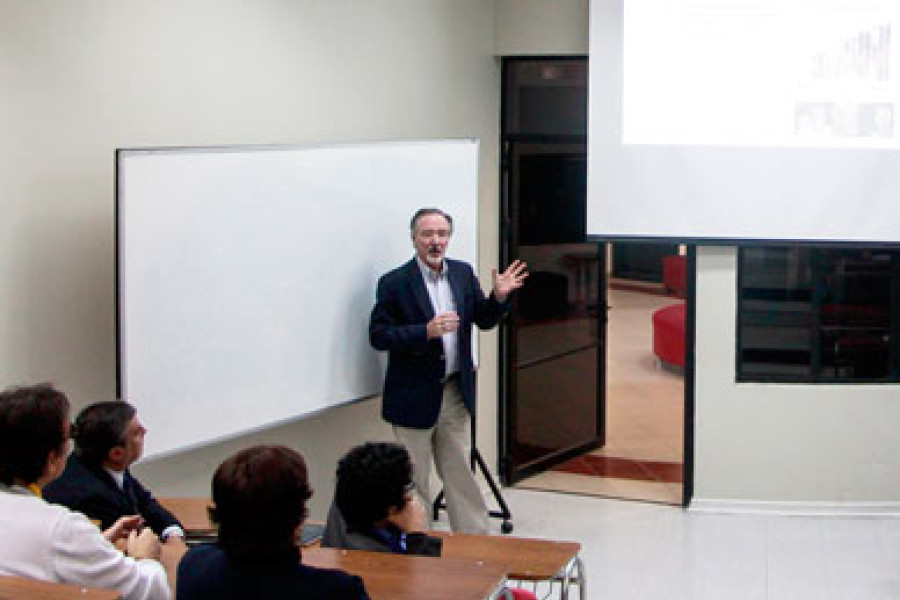Dr Alan Bennet, Executive Director of the University of California-Davis Center of Excellence that started operating in Chile this year, visited Universidad de Santiago de Chile. The purpose of the visit was to meet with professors and inform them about the opportunities that the center provides to work in partnership in order to create a platform for the development of collaborative research with the national agricultural-food sector. This is the first department that the renowned university has opened outside USA.
University of California-Davis Center of Excellence, the first department of this university outside USA, opened in Chile last April. Its purpose is to create a platform for the development of collaborative research with the national agricultural-food sector.Its Executive Director, Dr Alan Bennet, visited Universidad de Santiago on August 26th and met with professors at the university to inform them about the opportunities that the center provide to do collaborative work.“We work with industries to detect problems, form work teams with experts at Universidad de California-Davis and at Chilean universities that are part of the program, and now we want to find the best researchers at Universidad de Santiago to include them in this project,” Dr Bennet said.This center is part of the Attraction of International R&D Centers of Excellence program promoted by the Chilean Economic Development Agency (Corfo) that seeks to make Chile a regional hub of innovation. For this purpose, the center is already working with three national universities, i.e., Universidad de Tarapacá, Universidad de Talca and Universidad Andrés Bello, and Universidad de Santiago will be joining in soon.Dr Pablo Zamora, Scientific Director of the Center and PhD in Biotechnology from Universidad de Santiago, was also present at the meeting. He explained that, in the short term, they would like to expand their research lines to other production sectors that could require solving problems too. Currently, their projects are focused on viticulture and oenology, besides the three main initial research lines: genomic analysis, microbial detection and prediction of and adaptation to climate change.In this regard, Dr Zamora said that their work is mainly oriented to develop applied science, driven by the industry requirements. “Therefore, it is not a space for fundamental science, because we know that universities and technological centers are covering that area,” he said.The team of UC-Davis Chile said that they are looking for partners to expand their research lines; this is the reason why they have considered Universidad de Santiago as a strategic partner, with the capabilities required to face the challenges posed by this joint work.“We know a lot about Universidad de Santiago, because Pablo was a student at that university. Thanks to him, we know about the faculties and programs, and this is very helpful, because it allows us to recognize each other as research universities,” Dr Bennet said.A center for the agro-industrial sectorThe decision to establish this center in our country relates, in first place, to the historical collaboration links between Chile and California that date back to the sixties, to the government of Eduardo Frei Montalva. This agreement was ratified in 2008, during the first term of President Michelle Bachelet, giving origin to the “Chile-California Plan: a strategic association for the 21st century.” Besides, both territories share similar geography and climate conditions, as well as similar challenges, like diversifying the energy matrices.On the other side, the drought and constant frosts that affect the agricultural-food sector require effective solutions, and the science developed at universities could successfully address these problems.During his presentation, Dr Zamora said: “We want to bring capable people and, at the same time, we believe that in Chile, there are many researchers working on these issues who care about contingencies, and we want to help them to strengthen their work.”In this regard, Dr Zamora thinks that the fact of having this foreign institution in our country will lead to new business opportunities for the Chilean and global economy; to new developments and technologies and to their faster transfer to the market; to strengthening bilateral relations; to developing studies focused on the market to accelerate innovation; and to supporting the area of Life Sciences, with a special emphasis on the agricultural industry.The Department of Technology Management (DGT, in Spanish) will inform the researchers who may be interested in this alliance of what the process will be to present project proposals.Translated by Marcela Contreras


